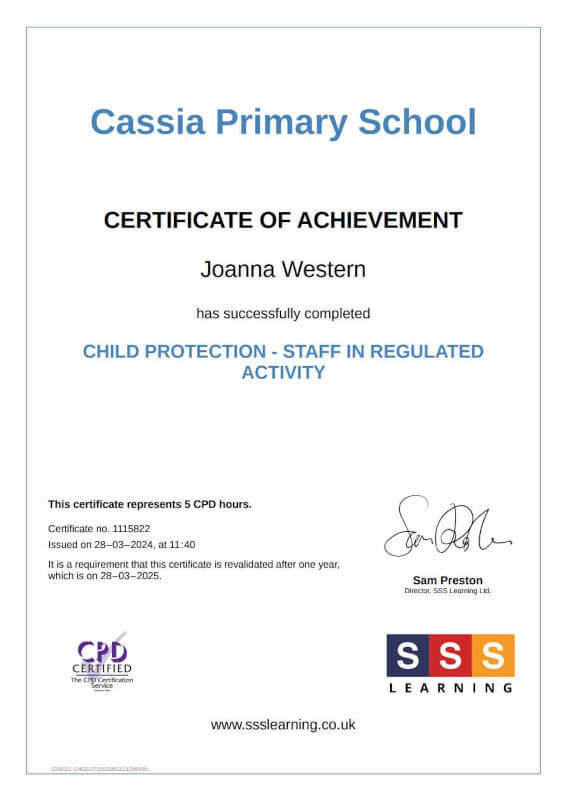Designated Safeguarding Leads (DSL) are the first point of contact for all safeguarding and child protection concerns in schools and academies. Those undertaking this role, and their deputies, must be equipped to respond to concerns and know how to make referrals where appropriate. As the central point of contact for child protection, they are also responsible for guiding the practice of other staff members.
Why use our DSL course?
- Full Compliance:
- Completion ensures full compliance with expected national DSL training requirements, delivering the highest quality DSL training to your staff
- Inspection Requirements:
- All CPD accredited certificates are stored securely in your admin dashboard, allowing you to provide full evidence of training on inpsection
- Our Safeguarding Specialists:
- Written specifically for eductional settings by our team of highly experienced safeguarding specialists
- Trusted:
- Used and trusted by thousands of schools and academies across the UK and by far the most effective way to train new DSLs to required standards
For existing DSLs, please see our DSL refresher course.
Pricing and how to buy
Cost is calculated according to the number of staff you wish to train.
Please enter the number of users required and click on 'Calculate price'.
What is covered in this course
Please note: E-Safety training is a key part of our DSL training and is included as part of the DSL course.
Designated Safeguarding Lead
- Defining the full context of the safeguarding remit
- Vetting and Barring arrangements
- Overview of key legislation and statutory guidance
- Duty of Care
- School / Academy Policy
- The role of the DSL
- Data
- Signs and symptoms of abuse
- Decision Making
- Child Protection concerns
- Assessment and referral processes
- Multi-agency
- Child Protection Plans
- Case Conferences
- Child in Need (CIN) Plans
- the Early Help Assessment Process
- Recording & sharing information externally
- The DSL role in Critical Incident Planning
- Domestic abuse
- Female Genital Mutilation (FGM)
- Breast Ironing
- Child Sexual Exploitation (CSE)
- Child Criminal Exploitation (CCE)
- Forced Marriage
- Honour Based Abuse (HBA)
- Prevent Duty
- Child-on-child abuse, including sexual violence and harassment
- County Lines
- Serious Violence
- Forced Marriage
- Legislation
- The barriers to recognising abuse and neglect
- Online safety
- The DSL and SENCo roles
- Behaviour and engagement
- Key characteristics of SEND conditions commonly presented in educational settings
- The purpose of an ICPC
- Initial Assessment and Section 47 Enquiries
- The role of the Independent Reviewing Officer (IRO)
- Representation at the ICPC
- Preparing and collating information
- The ICPC meeting format
- ICPC outcomes
E-Safety (including online safety)
- What is E-Safety?
- Key legislation.
- Sexual content
- Violent or distressing content, including: Online hate content; Harmful online challenges and hoaxes.
- Value-based content, including: Terror and extremist content; Radicalisation online.
- Biased content, including: Self-harm and suicide; Eating disorder content; Edited content; Misinformation and disinformation.
- How to support and educate children and young people having viewed ‘harmful’ content.
- Cyberbullying
- Trolling
- Sexual content including: Pornography;Sexting; Nude and semi-nude image sharing; Sexual abuse and exploitation.
- Online Grooming.
- The use of technology and risk including: An introduction to what children and young people like to do online and the technology they use
- Social media (pupils & staff)
- Online gaming
- Livestreaming
- Patterning
- Digital footprints.
The Dark Web and the risks to children and young people that it poses.
- Cyber security
- Cyber-attacks.
- Internet Use Policy and Acceptable Use Agreements
- Roles and responsibilities in reducing the risk of online abuse.
Time to complete course:
Maximum 6 hours, 50 minutes
Split into 14 modules
CPD points: 7
- Access anywhere 24/7/365
- 3D animation, video & voiceover
- Course notes
- Training for individuals & groups
- Includes support for all staff
- Tracked for compliance
- Downloadable CPD certificate
Compliance & CPD Certificate

With content produced by our subject specialists and external accreditation by the CPD Certification Service, you can be confident that all your staff are trained to the very latest best practice standards and compliant with statutory requirements on inspection.
All CPD certificates attained are stored in your admin dashboard and fully accessible when you need them.

Course Material Preview
All our course content is authored by our safeguarding subject specialists and tailored to meet statutory and non-statutory guidance.
Course participation is maximised through our use of stunning 3D animation, providing an engaging experience for the learner.
What's your training style?
Staff can train individually by accessing their own training account or collectively as part of a group using Group Training Mode at INSET. Both of these options are included in our platform.
| Benefits | Individual Training | Group Training |
|---|---|---|
| Certificates awarded to staff | ||
| Staff can complete training in their own time on their own device | ||
| Staff can complete training as a group at INSET |
How does it work?
The Admin dashboard
https://admin.ssslearning.co.uk
Our system requires no complicated setup. From the Admin Dashboard simply copy and send an invitation email to your staff with the login details for your school or academy. Once your staff commence training, all progress, results and CPD certificates are presented in the Admin Dashboard as evidence of training.
The Training site
https://training.ssslearning.co.uk
Staff complete a course individually via any PC, Mac, smartphone or tablet or as part of a group at INSET. Each course is made up of an engaging multimedia presentation created using 3D animation, comprehensive course notes and a fully tracked multiple-choice assessment. On completion, staff can view and print their CPD accredited certificate.
All courses are kept up-to-date with any changes in legislation or policy ensuring practice in your school or academy is compliant with current requirements.
Support for you and your staff
We are very proud of our customer service standards which are unrivalled, with full support for your staff, if needed, 7 days a week 8am until 10pm.
We have a 5 star LiveChat rating and always respond to support emails within minutes.

